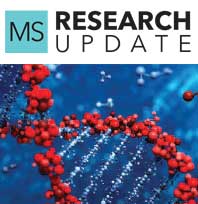Temelimab

In this Update
FDA-Approved Medications: Recently Approved
Experimental Medications: Monoclonal Antibodies
Company: GeNeuro
- Given via IV infusion
- Being studied in SPMS and PPMS
- Studies are postponed due to the COVID-19 pandemic
Previous: Rituxan® (rituximab) | Next: Ponesimod
A Phase II clinical trial to assess the efficacy of temelimab in progressive, non-relapsing forms of MS has been put on hold so that investigators can instead focus on developing solutions against COVID-19. Trial organizers also expressed concern about exposing individuals with MS to increased risk of viral infection during the pandemic.
The one-year clinical trial, when initiated, will test the efficacy of temelimab in slowing disability progression in severe, progressive forms of MS.1 Temelimab, a monoclonal antibody, is formulated to slow disease progression by targeting a human endogenous retrovirus (HERV), a protein that is either replicated from a host cell, is caused by a germ, or is hereditary.
The HERV protein activates immune cells that cause inflammation in the brain and destruction of the protective sheath (myelin) surrounding the nerve cells in the brain and spinal cord. The protein also inhibits development of myelin-generating cells called oligodendrocytes. It is hoped that neutralizing HERV will halt both the abnormal inflammatory immune response and neurologic deterioration and disease progression. This treatment approach is unlike that of currently approved DMTs.66
Temelimab showed efficacy in a previous Phase II clinical trial, called ANGEL-MS. The study enrolled 219 individuals with relapsing-remitting MS who had completed an earlier 48-week, Phase IIb trial, CHANGE-MS. Participants in ANGEL-MS were followed for up to 48 weeks, or 96 weeks after the start of CHANGE-MS. At study’s end, those who received monthly infusions of temelimab at 18 milligrams per kilogram (or approximately 2.2 pounds) of body weight showed lower volume of T1 hypointense lesions, which indicate severe damage to the central nervous system (CNS), compared with the placebo-treated group from CHANGE-MS.
No clinically relevant effect was seen on measures of CNS inflammation, however.67 In the previous CHANGE-MS trial, the 18 mg/kg dose was significantly more effective in slowing lesion development and CNS damage than two lower doses of the medication.66 Temelimab overall was well tolerated, and no dose-related safety issues were reported.67
